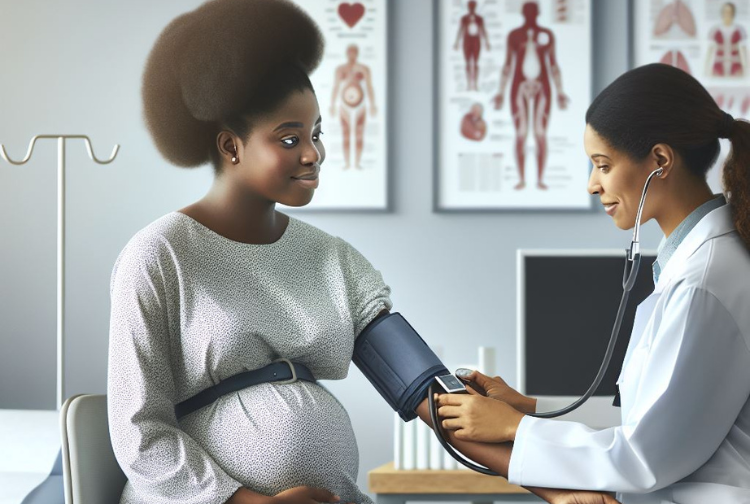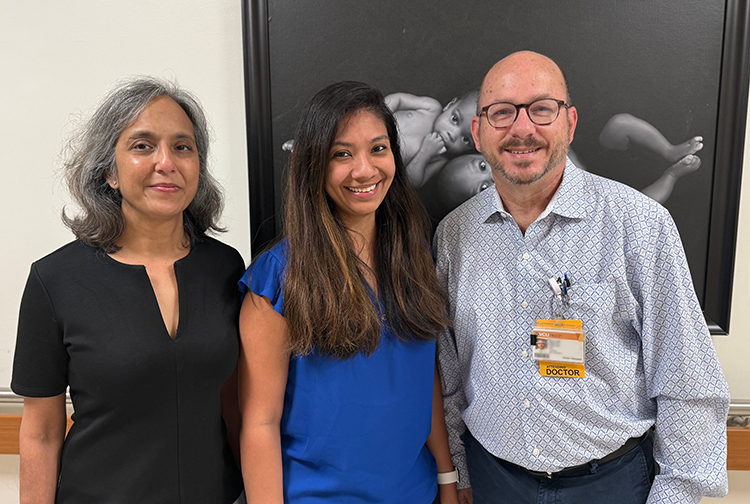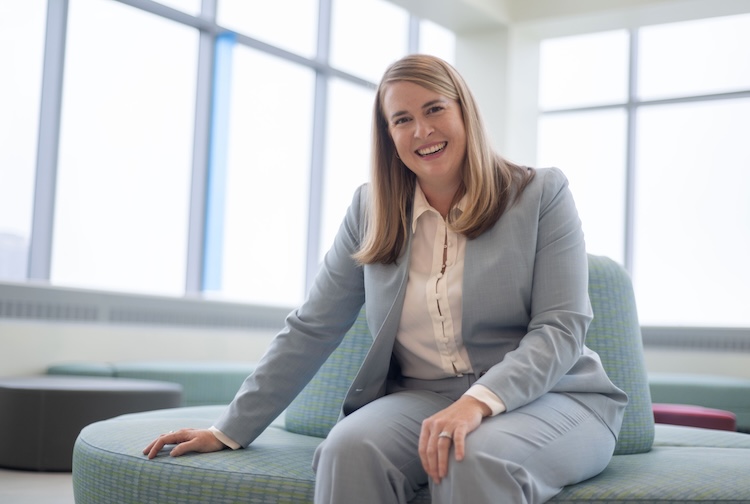What expecting moms need to know about preeclampsia and heart health
VCU Health experts say the condition can lead to dangerous changes in the heart later in life.
May 30, 2025 Preeclampsia is a pregnancy-specific disease that can lead to high blood pressure. (Contributed photo)
Preeclampsia is a pregnancy-specific disease that can lead to high blood pressure. (Contributed photo)
By Liz Torrey
Preeclampsia is a common and serious complication of pregnancy — so common, in fact, that routine prenatal care as we know it today first evolved in order to monitor women with this condition.
Women with preeclampsia have both high blood pressure and protein in their urine. If left untreated, preeclampsia can cause seizures, placental abruption, stroke and coma in the mother.
Getting a preeclampsia diagnosis, Ronald Ramus, M.D., says, is a “wake-up call.”
“Looking at it as a positive, not a negative – it’s a golden opportunity to change some aspects of your lifestyle: eating better, exercising, seeing your doctor on a regular basis so that these issues don’t become life-limiting or life-threatening issues later in life,” said Ramus, specializes in high-risk pregnancies and is part of VCU Health’s cardio-obstetrics and Maternal Fetal Medicine (OB) team – cardio-OB for short.
The cardio-OB team grew out of the existing Adult Congenital Heart Disease Program at the VCU Health Pauley Heart Center and now cares for women experiencing all forms of pregnancy-related cardiovascular disease, both during pregnancy and after childbirth.
“We focus on managing the entire pregnancy, with a particular focus on delivery and postpartum care,” Ramus added. “Many people think risk to the heart ends with delivery, but the highest mortality of women is in the eight weeks afterward.”
Three members of VCU Health’s cardio-OB team, Ramus, Sangeeta Shah, M.D., and Saima Shikari, DO, spoke with us about what pregnant women and their families need to know about the condition.

Sangeeta Shah, M.D. (left), Saima Shikari, DO (middle), and Ronald Ramus, M.D. (right), are part of VCU Health's cardio-OB team. (Liz Torrey, VCU Health Pauley Heart Center)
What is preeclampsia and what causes it?
Ramus: Preeclampsia is a pregnancy-specific disease that involves a “squeezing down” on the blood vessels. This squeezing down leads to hypertension, or high blood pressure, and that in turn can affect kidney function, liver function, brain function, vision and the heart.
We’re not sure what causes preeclampsia, but we know it involves the placenta – it's likely to be related to some type of faulty or imperfect implantation of the placenta.
Over time, preeclampsia becomes more and more unrelenting, and if it is not controlled, the baby is not going to grow.
What are some of the symptoms of preeclampsia?
Shah: Not everyone feels hypertension – that's why they call high blood pressure a “silent” disease. When you are pregnant, the most important thing is to be proactive: go to your OB visits and have your blood pressure checked. You can also consider monitoring your blood pressure at home.
In terms of preeclampsia symptoms, pregnant women might want to watch out for:
- Swollen legs at the end of the day, and when you wake up in the morning they’re still swollen
- Blurred vision
- Headaches that are unusual
- Sudden increase in weight over 1-2 days
- Abnormal shortness of breath
Of course, when you’re pregnant, you get short of breath. Maybe yesterday you did a flight of stairs and you were short of breath, but today, you had to stop halfway.
How is preeclampsia treated?
Ramus: The cure for the disease is always delivering the baby. But of course, we want to avoid an extremely premature delivery, so there are things we can do to buy time. For example, we might have a patient take blood pressure medication to ameliorate symptoms, control things and allow the pregnancy to get further along.
Treatment of the disease is a balance between the baby staying in utero for as long as possible and keeping mom safe. But ultimately, the real “cure” for the disease is to deliver your baby.
How is preeclampsia diagnosed?
Ramus: The two factors that confirm preeclampsia are high blood pressure and protein in your urine, known as proteinuria. Preeclampsia is typically diagnosed after the 20th week of pregnancy.
What are the risk factors for preeclampsia, and is there any way to prevent it?
Ramus: The number one risk factor for preeclampsia is underlying vascular disorders and diseases, like having a history of high blood pressure. Diabetes, lupus and obesity are all significant risk factors. The younger you are, or the older you are – especially older – preeclampsia is likely to be an issue. You’re at a higher risk if you are African American as compared to those who are white or Hispanic.
Shah: IVF moms also have a higher risk of developing preeclampsia. Also, if you had preeclampsia with your first pregnancy, you have a 15% to 20% risk of having preeclampsia with your second pregnancy, and then it’s additive. If you have pre-eclampsia with your second pregnancy, you have a 30% risk with a third pregnancy.
For women who are at risk of developing preeclampsia, aspirin has been shown to prevent it. Aspirin seems to affect the biochemical mediators that arise from faulty placenta, so that those mediators don’t have as dramatic of an impact on blood vessels in the body. But, if you’ve already got preeclampsia, aspirin doesn’t help very much.
How does preeclampsia affect the heart?
Shikari: It all comes back to the blood vessels. With a normal pregnancy, there are going to be changes to your heart – how much it weighs, how it functions – and the heart will return to the way it was after you delivered. But with preeclampsia, that remodeling occurs in a way that is abnormal and can lead to even more dangerous changes in the heart later in life.
If you’ve ever had preeclampsia, later on in life you’re at increased risk for chronic high blood pressure, stroke, abnormal heart rhythms like atrial fibrillation, heart failure, and chronic kidney or liver disease. Your risk level also depends on how severe your preeclampsia was.
Is there anything women can do to decrease that long-term risk?
Shikari: How many women do you know who say: “I’m fine, I’m doing things, I will worry about it later”? It’s not a “worry about it later” situation. You need to think about yourself right now.
You’ve been diagnosed with preeclampsia, you had your baby, and thankfully everything went fine with that. So now what do you do? You address your risk factors for heart disease. You want to make sure you’re getting your exercise in, eating a heart-healthy diet, getting to a healthy weight, regularly following up with your primary care doctor every year to check your cholesterol, blood pressure and make sure you are not developing diabetes. Those are the best things we can do to make sure you’re reducing your risk for heart disease going forward.
Shah: Women should also know that any time they go to the doctor or go to a new doctor, they need to highlight preeclampsia as part of their past medical history. It’s not a condition you only need to bring up in the context of pregnancy, or just at the OB-GYN.
What exactly is a “cardio-obstetrics” team? How do you all work together and work with patients who have preeclampsia?
Ramus: During pregnancy, the heart has to work hard to push blood out to the body. For most women in their 20s, 30s, even early 40s, their heart can handle that, no problem. But if you were born with a heart defect, even if that defect was fixed, your heart might not handle the stress of pregnancy as well. But there are also many women who have non-congenital heart issues during pregnancy.
Shikari: Pregnancy may be the first time that some women have been seen by a cardiologist, or even by a physician, in adulthood. After you age out of the pediatrician, young adults tend to fall off, and the next time they might see someone is when you are pregnant. So sometimes pregnancy leads to the diagnosis of other conditions, because of a lag in care.
If you already know that you have heart disease, congenital or otherwise, and you are thinking about getting pregnant, you should come to us. We can talk about what we can do to reduce your risk and whether it is safe for you to get pregnant. We have a whole team across cardiology, OB-GYN and maternal fetal medicine collaborating on your care.
Ramus: I think the unique thing we have here at VCU Health is intimate communication and collaboration between our different areas of medical specialty. That’s our big advantage and it’s been very much to the benefit of our patients.
Read more heart health stories on the Pauley Heart Center Blog




